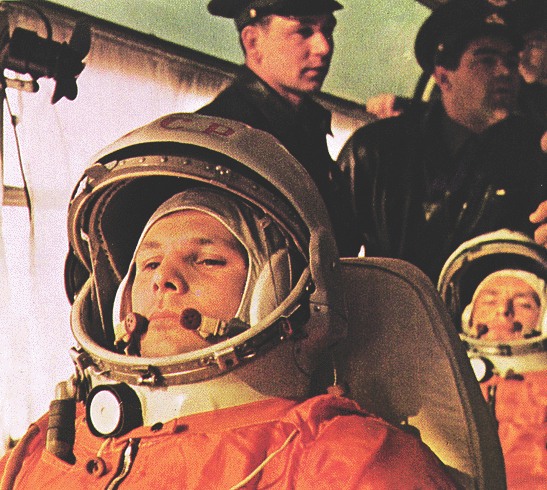 Those words were apparently interpolated from a claim made by Nikita Khrushchev some time later, to the effect that “Yuri Gagarin has orbited the Earth and didn’t see God up there”, but there’s no flight transcript that Gagarin actually said this. It does bring up an interesting thought, however.
Those words were apparently interpolated from a claim made by Nikita Khrushchev some time later, to the effect that “Yuri Gagarin has orbited the Earth and didn’t see God up there”, but there’s no flight transcript that Gagarin actually said this. It does bring up an interesting thought, however. It has been said elsewhere that gods (little “g”) were originally thought by primitive man to live on the mountain tops. When man climbed to the mountain tops, it was reported that there were no gods there, so it was then thought that the gods must reside above the clouds. When man gained the ability to see above the clouds, it was reported that there were no gods there, so it was then thought that the gods must reside in outer space. When man gained the ability to see and travel in outer space, where can the gods retreat to then?
When man stops looking for gods to physically “be” somewhere that we can observe, then men have to make inferences about features of the universe that are difficult to explain, and posit that gods, or “God” must be the cause of the feature(s), and thus we can “see” evidence that gods or God exists. Such it is with the existence of the universe.
I just finished reading Stephen Weinberg’s excellent book “The First Three Minutes”, a discussion of what elementary particle physicists and cosmologists agree can be known about the universe as early as one hundredth of a second after a hypothetical “big bang” singularity that might be the earliest point in the history of the observable universe that anything could be known. Even though this book was written in 1977, it is still fundamentally sound - and useful - today, 37 years after it was first published. And, although it’s not the point of the book, we don’t see any gods or God there, either. When you look into the night sky, there’s no omniscient, omnipotent being looking back at you. When astronomers look at the night sky, the furthest back they can look is to the Cosmic Microwave Background Radiation - the oldest remnants of the events that scientists now call the “Big Bang Model”. When the astronomer Edwin Hubble determined that the universe was expanding, it was eventually inferred that the universe must have been smaller in the past. And when you “run the clock backward” far enough, you get a smaller, denser, hotter universe, until, hypothetically, the whole universe crowds into a single point, the hypothetical “Big Bang Singularity”.
That’s not to say he/she/it/they are not there. That’s to say we should follow where the evidence leads us. And it leads us in the direction that doesn't appear inhabited by gods. If a remote, indifferent, deistic God exists at the end of the search, so be it. But the provincial, primitive conceptions of God that continue to pop up throughout history are past ready for relegation to the trash heap. Supernatural conceptions of existence don’t appear to be coherent, let alone operative in reality. So where can the gods retreat to?
There will always be, I presume, more to learn. Your neighbor may point to the hypothetical “Big Bang Singularity” and ask “how do you explain that?” You will not explain it of course, because right now there is no explanation for it, and you and I would be foolish to attempt one. What’s more, we don’t know that the idea of a “Big Bang Singularity” is correct. It may be that, when all the data are in, that something happens between then and now that explains where all the space-time, matter and energy come from. One idea is simply that the fundamental components of this universe have always existed in some form, and this universe’s emergence from what looks like a Big Bang - whatever is obscured behind the CMBR - is just a natural occurrence. It will be nice to know what that natural occurrence is, but I don’t expect it to be determined in my lifetime. It may be that the question “where did it all come from?” is nonsense. We need to be careful when insisting on answers - it may be that some things are fundamental, and cannot be further deconstructed.
Now, I’m neither a scientist nor a philosopher, so if you hear me say that “it may be that some things are fundamental, and cannot be further deconstructed” - it’s explicitly with the caveat “it may be that...”. It may be something else. It may be a bunch of things - I just don’t know. So I don’t want to make the mistake of appearing to arbitrarily set a limit to the depth of inquiry by declaring that some things are fundamental and have no further explanations. I can’t ever declare some things to be off-limits. More importantly and more generally, I don’t want to have sacred cows. I don’t want to limit my intellectual growth by setting boundaries. I don’t want to presuppose, from moment to moment, that anything that I think I know about existence is beyond questioning and revision. If I ever do, slap me.
Follow the evidence where it leads.
No comments:
Post a Comment